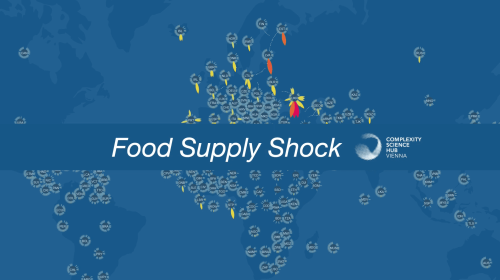Publication
Dependencies in the global food production network can lead to shortages in numerous regions, as demonstrated by the impacts of the Russia–Ukraine conflict on global food supplies.
Here we reveal the losses of 125 food products after a localized shock to agricultural production in 192 countries and territories using a multilayer network model of trade (direct) and conversion of food products (indirect), thereby quantifying 108 shock transmissions.
We find that a complete agricultural production loss in Ukraine has heterogeneous impacts on other countries, causing relative losses of up to 89% in sunflower oil and 85% in maize via direct effects and up to 25% in poultry meat via indirect impacts.
Whereas previous studies often treated products in isolation and did not account for product conversion during production, the present model considers the global propagation of local supply shocks along both production and trade relations, allowing for a comparison of different response strategies.
M. Laber, P. Klimek, M. Bruckner, L. Yang, S. Thurner, Shock propagation from the Russia–Ukraine conflict on international multilayer food production network determines global food availability, Nature Food 4 (2023) 508-517, doi: 10.1038/s43016-023-00771-4.
Related
Explore effects of global supply disruptions via interactive visualizations and maps.



Signup
| Cookie | Duration | Description |
|---|---|---|
| cookielawinfo-checkbox-analytics | 1 year | Set by the GDPR Cookie Consent plugin, this cookie records the user consent for the cookies in the "Analytics" category. |
| cookielawinfo-checkbox-functional | 1 year | The GDPR Cookie Consent plugin sets the cookie to record the user consent for the cookies in the category "Functional". |
| cookielawinfo-checkbox-necessary | 1 year | Set by the GDPR Cookie Consent plugin, this cookie records the user consent for the cookies in the "Necessary" category. |
| CookieLawInfoConsent | 1 year | CookieYes sets this cookie to record the default button state of the corresponding category and the status of CCPA. It works only in coordination with the primary cookie. |
| PHPSESSID | session | This cookie is native to PHP applications. The cookie stores and identifies a user's unique session ID to manage user sessions on the website. The cookie is a session cookie and will be deleted when all the browser windows are closed. |
| viewed_cookie_policy | 1 year | The GDPR Cookie Consent plugin sets the cookie to store whether or not the user has consented to use cookies. It does not store any personal data. |
| Cookie | Duration | Description |
|---|---|---|
| mec_cart | 1 month | Provides functionality for our ticket shop |
| VISITOR_INFO1_LIVE | 6 months | YouTube sets this cookie to measure bandwidth, determining whether the user gets the new or old player interface. |
| VISITOR_PRIVACY_METADATA | 6 months | YouTube sets this cookie to store the user's cookie consent state for the current domain. |
| YSC | session | Youtube sets this cookie to track the views of embedded videos on Youtube pages. |
| yt-remote-connected-devices | never | YouTube sets this cookie to store the user's video preferences using embedded YouTube videos. |
| yt-remote-device-id | never | YouTube sets this cookie to store the user's video preferences using embedded YouTube videos. |
| yt.innertube::nextId | never | YouTube sets this cookie to register a unique ID to store data on what videos from YouTube the user has seen. |
| yt.innertube::requests | never | YouTube sets this cookie to register a unique ID to store data on what videos from YouTube the user has seen. |
| Cookie | Duration | Description |
|---|---|---|
| _ga | 1 year | Google Analytics sets this cookie to calculate visitor, session and campaign data and track site usage for the site's analytics report. The cookie stores information anonymously and assigns a randomly generated number to recognise unique visitors. |
| _ga_* | 1 year | Google Analytics sets this cookie to store and count page views. |
| _gat_gtag_UA_* | 1 min | Google Analytics sets this cookie to store a unique user ID. |
| _gid | 1 day | Google Analytics sets this cookie to store information on how visitors use a website while also creating an analytics report of the website's performance. Some of the collected data includes the number of visitors, their source, and the pages they visit anonymously. |